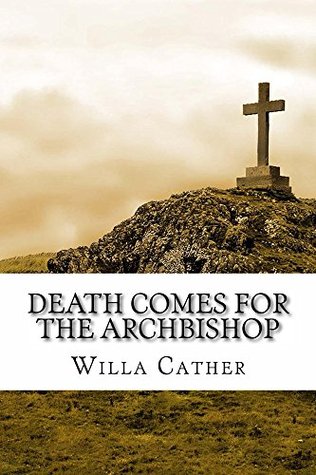More on this book
Community
Kindle Notes & Highlights
Ah well, that is a missionary's life; to plant where another shall reap."
"Where there is great love there are always miracles," he said at length. "One might almost say that an apparition is human vision corrected by divine love. I do not see you as you really are, Joseph; I see you through my affection for you. The Miracles of the Church seem to me to rest not so much upon faces or voices or healing power coming suddenly near to us from afar off, but upon our perceptions being made finer, so that for a moment our eyes can see and our ears can hear what is there about us always."
As he stood there in his buckskin clothes one felt in him standards, loyalties, a code which is not easily put into words but which is instantly felt when two men who live by it come together by chance.
here there was always activity overhead, clouds forming and moving all day long. Whether they were dark and full of violence, or soft and white with luxurious idleness, they powerfully affected the world beneath them. The desert, the mountains and mesas, were continually reformed and re- coloured by the cloud shadows. The whole country seemed fluid to the eye under this constant change of accent, this ever-varying distribution of light.
The rock, when one came to think of it, was the utmost expression of human need; even mere feeling yearned for it; it was the highest comparison of loyalty in love and friendship. Christ Himself had used that comparison for the disciple to whom He gave the keys of His Church. And the Hebrews of the Old Testament, always being carried captive into foreign lands,--their rock was an idea of God, the only thing their conquerors could not take from them.
a strange literalness, often shocking and disconcerting. The Ácomas, who must share the universal human yearning for something permanent, enduring, without shadow of change,--they had their idea in substance. They actually lived upon their Rock; were born upon it and died upon it. There was an element of exaggeration in anything so simple!
Father Vaillant's maxim that if you said your prayers first, you would find plenty of time for other things afterward.
In those days, even in European countries, death had a solemn social importance. It was not regarded as a moment when certain bodily organs ceased to function, but as a dramatic climax, a moment when the soul made its entrance into the next world, passing in full consciousness through a lowly door to an unimaginable scene.
When they were tramping home, Father Joseph said that, as for him, he would rather combat the superstitions of a whole Indian pueblo than the vanity of one white woman. "And I would rather do almost anything than go through such a scene again," said the Bishop with a frown. "I don't think I ever assisted at anything so cruel."
the Cross that took away indignity from suffering and made pain and poverty a means of fellowship with Christ.
"My friend has come." That was all, but it was everything; welcome, confidence, appreciation.
procedure, Father Latour judged that, just as it was the white man's way to assert himself in any landscape, to change it, make it over a little (at least to leave some mark of memorial of his sojourn), it was the Indian's way to pass through a country without disturbing anything; to pass and leave no trace, like fish through the water, or birds through the air. It was the Indian manner to vanish into the landscape,
They seemed to have none of the European's desire to "master" nature, to arrange and re-create. They spent their ingenuity in the other direction; in accommodating themselves to the scene in which they found themselves.
The land and all that it bore they treated with consideration; not attempting to improve it, they never desecrated it.
Of all the countries he knew, that desert and its yellow people were the dearest to him. But it was the discipline of his life to break ties; to say farewell and move on into the unknown.
"I often think, Jean, how you were an unconscious agent in the hands of Providence when you recalled me from Tucson. I seemed to be doing the most important work of my life there, and you recalled me for no reason at all, apparently. You did not know why, and I did not know why. We were both acting in the dark. But Heaven knew what was happening on Cherry Creek, and moved us like chessmen on the board. When the call came, I was here to answer it--by a miracle, indeed."
The old man smiled. "I shall not die of a cold, my son. I shall die of having lived."
"Setting," Molny used to tell Father Latour, "is accident. Either a building is a part of a place, or it is not. Once that kinship is there, time will only make it stronger."
Beautiful surroundings, the society of learned men, the charm of noble women, the graces of art, could not make up to him for the loss of those light-hearted mornings of the desert, for that wind that made one a boy again. He had noticed that this peculiar quality in the air of new countries vanished after they were tamed by man and made to bear harvests. Parts of Texas and Kansas that he had first known as open range had since been made into rich farming districts, and the air had quite lost that lightness, that dry aromatic odour. The moisture of plowed land, the heaviness of labour and
...more
Men travel faster now, but I do not know if they go to better things."


